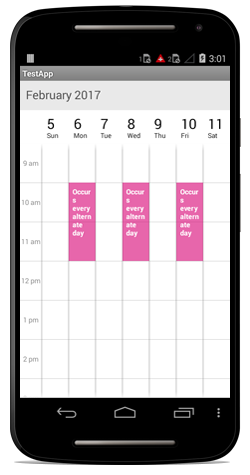Recurrence
11 Aug 20175 minutes to read
Recursive appointments can be created by enabling IsRecursive property in Schedule appointments, to know more about adding appointments in the control, refer Schedule Appointment.
And then need to set the RecurrenceRule to populate the required recursive appointment collection in a specific pattern.
Recursive appointment can be created in any recurrence patterns, for instance, some events can be repeated every week such as “Server maintenance”, where as some on them may repeat every year like wedding anniversary.
Recurrence Pattern
- Recurrence pattern used in the control are in
iCalstandard - Schedule control supports all four types of recurrence patterns.
- Daily Recurrence
- Weekly Recurrence
- Monthly Recurrence
- Yearly Recurrence
RRULE generator
RecurrenceGenerator/ recurrence builder is available with the control to create RRULE. RRULE can be easily created through this engine by simple APIs available.
ScheduleAppointmentCollection appointmentCollection;
//..//
//creating new instance for schedule
SfSchedule schedule = new SfSchedule(this);
schedule.ScheduleView = ScheduleView.WeekView;
appointmentCollection = new ScheduleAppointmentCollection();
//Recurrence Appointment 1
//Creating new events
ScheduleAppointment appointment1 = new ScheduleAppointment();
Calendar currentDate = Calendar.Instance;
Calendar startTime = (Calendar)currentDate.Clone();
Calendar endTime = (Calendar)currentDate.Clone();
//setting start time for the event
startTime.Set(
currentDate.Get(CalendarField.Year),
currentDate.Get(CalendarField.Month),
currentDate.Get(CalendarField.DayOfMonth),
10, 0, 0
);
//setting end time for the event
endTime.Set(
currentDate.Get(CalendarField.Year),
currentDate.Get(CalendarField.Month),
currentDate.Get(CalendarField.DayOfMonth),
12, 0, 0
);
appointment1.StartTime = startTime;
appointment1.EndTime = endTime;
appointment1.Color = Color.ParseColor("#FF1BA1E2");
//setting Subject for the event
appointment1.Subject = "Client Meeting";
appointment1.IsRecursive = true;
//setting recurrence properties
RecurrenceProperties recurrenceProp1 = new RecurrenceProperties();
recurrenceProp1.RecurrenceType = RecurrenceType.Daily;
recurrenceProp1.IsDailyEveryNDays = true;
recurrenceProp1.DailyNDays = 2;
recurrenceProp1.IsRangeRecurrenceCount = true;
recurrenceProp1.IsRangeNoEndDate = false;
recurrenceProp1.IsRangeEndDate = false;
recurrenceProp1.RangeRecurrenceCount = 10;
recurrenceProp1.RecurrenceRule = RecurrenceBuilder.RRuleGenerator(recurrenceProp1, appointment1.StartTime, appointment1.EndTime);
appointment1.RecurrenceRule = recurrenceProp1.RecurrenceRule;
//adding appointment to the collection
appointmentCollection.Add(appointment1);
schedule.Appointments = appointmentCollection;
// Set our view from the "main" layout resource
SetContentView(schedule);